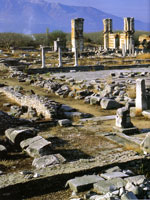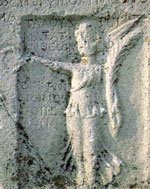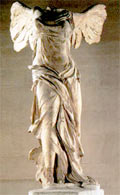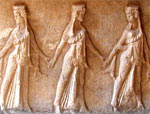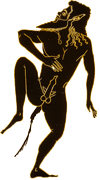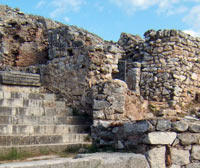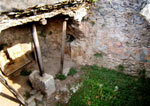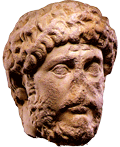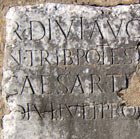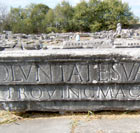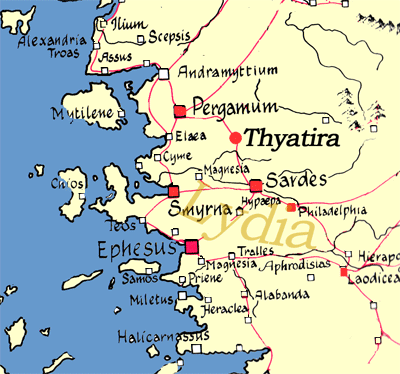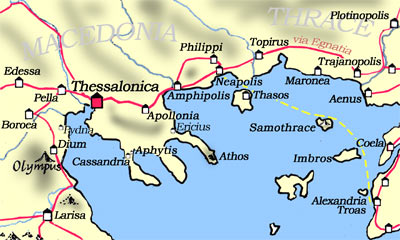"Frontier town"
Philippi 2nd century forum with 6th century basilica beyond.
Until the annexation of Thrace by Claudius in 46 AD, Macedonia was Rome's most easterly province in Europe and Philippi its most easterly city.
If, in the late 40s or early 50s, Paul really had been traipsing west, he might have passed units of the Moesian legions moving east, as the new province was organized!
New World Order
Victoria Augusta. This relief on a theatre pillar at Philippi commemorates the victory of Octavian and Antony in 42 BC.
Acts 16 claims that St Paul was "called to rescue Macedonians" – but then went on to establish a church in this Latin-speaking town, populated by retired Roman soldiers.
Early colonists at Philippi included troops formerly loyal to Antony who were displaced from Italy after Octavian's victory at Actium in 31 BC.
Flying Pigs Department
"What made it possible for a wandering Jewish preacher and part-time tentmaker to turn up in a city knowing no one, and leave it with a new Christian church firmly established there?"
– Stourton, In the Footsteps of St Paul, p88.
Mystery Island
Samothrace – rising more than 5300' from the sea. Too mountainous for cultivation, the high peaks and deep wooded valleys, often shrouded in mist, give the island an aura of "mystery and magic".
Paul, we're told, passed this way. If true, he was passing a pagan sanctuary second only to Eleusis in importance.
In contrast to the Mysteries of Eleusis, the rites of the Great Gods were open to all – "male and female, slave and free."
The Great Gods
"Winged Victory of Samothrace" – ancient pre-Christian masterpiece.
This statue of the goddess Nike once graced the Sanctuary of the Great Gods.
The sacred island of Samothrace remained independent until Vespasian absorbed the island into the Roman Empire in AD 70.
Dancing Girls, Randy Gods
Samothrace was the site of important Hellenic and pre-Hellenic religious ceremonies. The primary god was the "Great Mother" Alceros Cybele, a fertility goddess, whose consort was the phallic god Kadmilos.
Paul's water cistern "prison"
What purports to be Paul's "prison" is actually a water cistern to the side of a temple precinct.
The extant ruins show no evidence of a highly localized "earthquake", nor are they large enough for an "inner" (and presumably "outer" prison), stocks, doors and several prisoners – all part of the fairy tale of Acts 16. Remnants of pious frescoes from the 6th century are still visible.
In reality, in the degenerate city of the Byzantines, a suitable structure was chosen as a shrine to enthrall the gullible. The short-lived prosperity of the city in the 5th and 6th centuries was largely due the martyr cult of Paul.
Tour parties of Christian pilgrims still visit the "prison" today. Local archaeologists are reluctant to disabuse a lucrative income stream.
'After the church was destroyed a chapel was built outside the southwest corner of the atrium; a cistern lay beneath it, which was later transformed into a cult place with frescoes, believed to have been "St Paul's Prison". '
– Evangelia Kypraiou, Philippi (Hellenic Ministry of Culture,2006) p32.
Thyatira feels the heat
"And unto the angel of the church in Thyatira write;
... because thou sufferest that woman Jezebel, which calleth herself a prophetess, to teach and to seduce my servants to commit fornication, and to eat things sacrificed unto idols ...
I will cast her into a bed, and them that commit adultery with her into great tribulation ... And I will kill her children with death; and all the churches shall know that I am he which searcheth the reins and hearts."
– Revelation of St John 2:18-23.
Thyatira thanks Hadrian
An inscribed decree from a city of Asia is to be seen at Athens – the place where Paul eventually finds himself.
The inscription hails Hadrian as the "greatest of kings", thanks Hadrian for inaugurating the Panhellenion (the "all-Greek" league) and honours Hadrian for his beneficence to the city. That city was Thyatira.
(Lane Fox, The Classical World).
Luke WHO?
It is questionable whether the author of the "genuine" Pauline epistles knew of any "biographer" named Luke.
In the entire Pauline corpus there are only three passing mentions of a Luke – and all appear in epistles deemed "inauthentic" by many scholars.
Colossians 4:14
"Luke, the beloved physician, and Demas, greet you."2 Timothy 4:11
"Only Luke is with me. Take Mark, and bring him with thee: for he is profitable to me for the ministry."Philemon 23-24
"There salute thee Epaphras, my fellow prisoner in Christ Jesus; Marcus, Aristarchus, Demas, Lucas, my fellow labourers."Even if these references were genuine they surely damn with faint praise the supposed evangelist. No wonder Luke's "biography" of Paul scarcely agrees with a word of Paul's own epistles!
The earliest evidence of the name "Luke" associated with a gospel is the Muratorian fragment, dated to about 170 AD.
Baur on "Philippians"
" In a genuine Pauline Epistle we should expect that, besides the spiritual content, one should expect some new information not derivable from other sources — about the situation and circumstances at the time, the occasion of the writing, and so many matters of interest which unmediated reality transmits of itself.
Here, however, we have poverty of thought, absence of any historical motivation, lack of coherence; we have nothing specific or concrete, nothing to give us the impression of originality, nothing but a dull and colourless reflection."
– F. C. Baur, Paul. The Apostle of Jesus Christ, 1875.
Pagan head at Philippi defaced with Christian cross on forehead.
By the 4th century the golden age of sculpture had passed but pious vandalism was coming into its own.
Philippi - a Latin town
A traitor called "Christ"!
In 65 AD a plot to assassinate Nero led by Calpurnius Piso was betrayed by a freed slave called Milichus working in the service of a fellow conspirator, Flavius Scaevinus. Records Tacitus:
"His slave's brain considered the rewards of treachery and conceived ideas of vast wealth ... He was taken by the door keepers to Nero's freed slave Ephaphroditus – who conducted him to Nero ...Milichus was richly compensated, and adopted the Greek word for 'Saviour' as his name." – Annals 15.15.
When Nero botched his suicide two years later, it was his own former slave Ephaphroditus who completed the job. The freedman shares the name of Paul's supposed playmate from Philippi and in his epistle to the Philippians Paul calls him a "fellow soldier".
The same letter refers to "the palace" and closes with a curious salutation from "Caesar's household" – often interpreted as (ludicrous) references to Christians within the praetorian guard or state officials.
But the author of the epistle may simply be trying to establish rapport with a military canton whose residents would respect such terms.
Flush toilets – NOT the Christian way
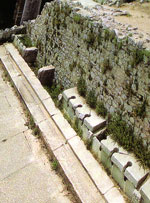
The communal latrine at Philippi was flushed clean by a continuous flow of water. The facility was regarded with shame by the Christians and was buried during the construction of the Christian basilica.
Presumably God favoured the pot and a more hazardous disposal method.
|
It is possible that a 1st century Christian apostle called Paul sailed from the port of Troas in Asia Minor and began an evangelical crusade in Europe – but extremely improbable. Not only is the purported journey unsupported by a shred of archaeological or historical evidence but the missionary's itinerary is a curious mix of regurgitated fable and elements cribbed from secular history. The palpable literary devices used by the author of Acts of the Apostles to "move the story on" speak volumes of the symbolic, rather than historic, nature of Paul's journey.
Messages from the spirit world?
One might reasonably wonder how on earth Paul had recognized that the figure in his nocturnal vision was a "man of Macedonia"? Did he, perhaps, dress differently from other Greeks, or was it simply that the spirit had introduced himself as a Macedonian? Either way, why were the spiritual needs of Macedonia so much more deserving of the apostle's attention than the vast number of Romano-Greek cities of Roman Asia? It was, of course, an earlier injunction from the spirit realm that determined Paul's action:
The apostle himself, far from confirming that a "night vision" called him from Asia to Philippi, gives a rather more prosaic explanation for his trip north:
Curiously, a "night vision in Asia just before a crossing to Philippi" is not unique to the book of Acts. It is also to be found in Plutarch's Life of Brutus!
So who DID win Asia for Christ? Even without Paul's evangelical zeal, Roman Asia did become the heartland of early Christianity. Here were to be found the "seven churches" to which the Revelation of St John addressed its gore-fest of the End Time.
Unconvincingly, Acts 19.10 would have us believe that the apostle's later stay in Ephesus was so dynamic that "all they which dwelt in Asia heard the word of the Lord Jesus, both Jews and Greeks" but this sits oddly alongside Paul's own statement that in Asia he went in fear of his life:
Pope Benedict made the pilgrimage to the dubious "Virgin's house" in November, 2006.
And Bithynia? The first time we hear reliably of Christians in secular history – the celebrated letter of Pliny to Trajan around the year 112 AD – it is in reference to the province of Bithynia, the province directly north of Roman Asia. Pliny, the provincial governor, is concerned about an unfamiliar "contagious superstition" and reports to the emperor " ... all I could discover was, that these people were actuated by an absurd and excessive superstition ... not confined to the cities only, but has spread its infection among the neighboring villages and country" (Letter 97). Remarkably, here is another centre of early Christianity and yet Bithynia is the other province forbidden to the apostle Paul by the Holy Spirit!
Whistle Stop: Samothrace Second most important sanctuary in the Greek world.
Before Christians destroyed the temple complex at the end of the 4th century, Samothrace had been a centre of pagan pilgrimage for a thousand years. It was the spiritual heart of the northern Aegean. The majestic island rises more than 5000 feet from the sea and as early as the 8th century BC had been colonized by Greeks from Samos (hence the name Samos of Thrace or Samothrace). On the north coast of Samothrace, at Palaeopoli (the "old city"), the colonists began the construction of the Sanctuary of the Great Gods. The queen of Egypt (and Thracian princess) Arsinoe rebuilt the sacred precinct in the early 3rd century BC. Devotees of the pre-Olympian deities were called the Cabeiri, for whom it is said the chief symbol was the erect phallus. According to Herodotus it was from Samothrace that this icon of fertility entered the art of Greece. Illustrious initiates at the shrine included King Lysander of Sparta, Philip II of Macedon, Lucius Calpurnius Piso, the father-in-law of Julius Caesar – and the Emperor Hadrian.
From the port of Neapolis, a half-day climb along the Via Egnatia would have brought any itinerate preacher to the walls of Philippi.
Philippi – Paul, called by Macedonian Man, finds Woman of Asia instead!
If Paul's tale were history rather than fantasy it would indeed be curious that the anomalous Roman colony of Colonia Victrix Philippensium should be the first "mission" in the apostle's evangelical campaign in Europe. After all, Paul was supposedly drawn to Macedonia to save the souls of the locals, not Roman settlers. Compounding the anomaly, although summoned in a dream by a "Macedonian man", Paul's first convert is a woman from Asia, a Lydia from Lydia!
Reality Check Philippi was originally a Thracian town just north of an extensive swamp. Philip II of Macedonia took the city, both because of its strategic location and the gold mines in the neighbouring hills, and renamed it for himself. Here, in the year 42 BC Octavian and Antony had triumphed over Brutus and Cassius in one of the most decisive battles of the ancient world. After the battle, worship of the deified Caesar, already established at Rome, was inaugurated at Philippi. Ten years later, following the rout of Antony at Actium, a full-blown emperor cult was promoted throughout the empire. Octavian, reports Cassius Dio –
Particularly in the 2nd and 3rd centuries the imperial cult was a challenge and competitor to the upstart faith of Christ. It was abolished by Constantine, the first Christian emperor, who nonetheless bathed himself in the same transcendent light of emperor worship, God's viceroy on earth. The colony at Philippi remained the most easterly Roman settlement in Europe until 46 AD, when the murder of the Thracian king Rhoemetalces by his wife gave the emperor Claudius a pretext to absorb Thrace into the empire.
A Jewish evangelist in town? A difficulty in Philippi for any would-be evangelist from the Orient was that the official language of the town was Latin, not Greek, settled as it was by veterans from the legions after the great battle and, in the early 2nd century, by veterans of the Dacian wars.
Religious competition in Philippi was intense. The town was particularly well-provided with pagan shrines. To the Egyptian deities introduced in the 3rd century BC – Isis, Serapis and Horus-Harpocrates – were added Artemis, Hermes, Cybele, and the "hero-horseman" from the Hellenic period; and Apollo, Silvanus, Bacchus and Jupiter from the Roman settlement. A further difficulty for a Jewish innovator was that Philippi had no synagogue and probably few Jews. And yet in the fable of St Paul we know that the "apostle to the Gentiles" always sought out local Jews, even though, predictably, they would reject his message: Salamis (Acts 13.5), Antioch in Pisidia (13.14), Iconium (14.1), Ephesus (18.19), Berea (17.10), Athens (17.17) and Corinth (18.4). In fact, when Paul leaves Philippi we're told that he passes straight through Amphipolis and Apollonia – major towns themselves – in order to reach Thessalonica "where was a synagogue of the Jews and Paul, as his manner was, went in unto them, and three sabbath days reasoned with them out of the scriptures" (Acts 17.1-2). This "reversion to type" illustrates how unbelievable is the Philippian episode. In its unsatisfactory, skimpy fashion Acts indicates that, at Philippi, prayers were "wont to be made" by the river side (which could only have been the river Gangitis). It was the Jewish sabbath so one is led to believe that those at prayer that day were entreating not a river deity but the correct, Jewish god. And yet, since Yahweh wasn't a river god, why was it necessary to gather by the river? Prayers, surely, could have been made anywhere? The reason, of course, is that the story anticipates what is to follow: baptism. Paul finds his heroine – a gentile “worshipper of God”. Remarkably, she is already a fan of Yahweh so his task is much easier. In fact, ridiculously easy – so unlike conversion of the hard-hearted Jews! How long it took her "to attend unto the things which were spoken of Paul" we have no idea but implicitly she (and her household!) accept the new religion in a trice. And who is this woman? Paul forsook the country of Lydia (Roman Asia) – and in northern Greece made his first convert, a woman named Lydia. And she just happened to be a native of Roman Asia! Does any of this sound entirely kosher? According to Acts, Paul and his companions "abide" in the house of this Lydia, but in Paul's own epistle to the Philippians this first convert and early church patron gets not so much as a mention!
Thyatira and the Python And there's more. Lydia is from "the city of Thyatira, a seller of purple" (Acts 16.14). But purple wasn't sold to just anyone – it was a prerogative of royalty and an emblem of power. It was also extremely expensive and a commodity unlikely to be traded in a provincial new town. These literary choices have symbolic not factual value. Thyatira was a city in the "industrial heartland" of Roman Asia, a town noted for its proliferation of trade guilds, each with its own favoured deity. The city is named in the Revelation of St John where that cultic activity is represented by an unrepentant fornicating prophetess called Jezebel (yes, named after the evil queen of Israel!) She is cursed with tribulation and infanticide.
Although (bizarrely) the girl prophesied "correctly" (see side box) Paul "rescues" the unnamed prophetess by expelling her spirit guide. The choice of words is highly significant. In the original Greek of Acts 16.16 (but lost in the English translation) the girl is possessed of a "python spirit." The python in question refers to a snake or dragon that guarded the oracle at Delphi and was killed by Apollo. In time, the phrase came to mean a spirit that spoke through a soothsayer. Paul's exorcism of the girl's "python" provoked the ire of the soothsayer's minders, providing a pretext for the next unlikely episode: a night in jail and Paul's mini "passion".
One night in jail? Welcome to Dreamland
The idea that Roman magistrates, high ranking soldiers at that, would follow the practice of Jewish high priests and tear their own clothes on hearing blasphemy, is farcical in the extreme. But then the whole "biography" of Paul in Acts is a palpable fiction. The trial in Philippi cannot itself be countenanced as an historical event because it is predicated on the unreasonable claim that the apostle and his acolytes could really have enraged the "multitude" and "troubled" the city. As ever, the Christian story-tellers love to aggrandize the comings and goings of their super heroes. Acts reports that the magistrates accept without question the accusers' statement and order immediate scourging. Paul and Silas (but not Timotheus and Luke?) submit to the beating, are imprisoned and only then, after a night in the stocks, claim their rights as "Roman citizens"? The author of the yarn knows full well that the story would collapse if his hero had made the claim up front. The "Christ-like" trial, scourging and imprisonment provide the setting for a "mighty deliverance" whereby midnight prayer brings on an earthquake so localized that it merely opens doors and unfastens fetters. And unlike Peter, freed by an angel from a Jerusalem gaol, who speedily makes good his escape, Paul hangs around to baptize a convert. Such stoicism!
Paul deigns to leave Philippi after "abiding certain days". And left behind in the city – but leaving not a trace on the historical landscape – was his purported biographer, "Doctor" Luke.
Cool Hand Luke?
So Luke "stays on" at Philippi? The return to "we" narration in Acts 20/21 and again in 27/28 suggests that Luke rejoins Paul on the return leg of the apostle's third missionary journey, having missed all of Paul's adventures in Thessalonica, Athens and Corinth. But just what does "Luke" have to show for his four years in Philippi? Absolutely nothing. Paul's "one night in prison" basks in eternal fame and yet "Dr" Luke, supposedly author of both a gospel and the Acts of the Apostles, reports not a word. The fate of Luke is completely unknown ("hanged on an olive tree" and "dying naturally and unwed at 84" are both Church "traditions"). Oh well. Perhaps Luke just put his feet up for a while and let that egocentric tentmaker from Tarsus earn his money.
Paul's Church at Philippi? There is neither archaeological nor literary evidence for the foundation of a Christian community at Philippi by an apostle called Paul. But there is evidence for the manufacture of martyr cult of Paul at Philippi beginning in the 4th century, that is, after the Christian religion entered the corridors of power. Funerary inscriptions indicate the presence of Christians in the city in the 3rd century but how "orthodox" they may have been is impossible to establish. If we can believe Church "tradition" as it relates to Polycarp, a bishop at Smyrna – eighty-six years in the service of Christ and then martyrdom – in the latter half of the 2nd century the venerable bishop wrote a two-thousand word epistle to the Church of God at Philippi. Evidently, the early church here, as elsewhere, was rent by discord and factionalism. Repeatedly, Polycarp calls for "fortitude" and "endurance". He berates "vapid discourses and sophistry of the vulgar", warns against "love of money" and condemns "fornication, perversion and sodomy". Clearly, the early Church had already acquired all the characteristics it would manifest in later centuries. Aside from the sexual and financial malpractice of the Philippians, "orthodoxy" clearly had a problem with doctrinal variety – its cardinal dogmas were being challenged:
Paul writes a letter? Supposedly, a century before Polycarp, around the year 60 AD, Paul himself wrote to the Philippians. Paul's epistle is one of the so-called "prison letters" (together with Philemon, Colossians and Ephesians), traditionally ascribed to Paul in captivity – though without any consensus as to where or when that captivity might have been. Apparently, Paul has the services of his servant Timotheus, a truly curious "imprisonment". Whilst the letter speaks of being a "prisoner in Jesus Christ" it also anticipates "coming shortly" to see the Philippians (1.27; 2.24), which hardly suggests impending doom:
The fact that the letter is addressed to "all the saints ... bishops and deacons" hardly suggests the embryonic community of a new church. The letter has no obvious motive or occasion. In part it expresses thanks to the Philippians for support, both material ("fruit") and for the loan of Epaphroditus who "ministered" to Paul's wants and had been sick "nigh unto death, not regarding his life, to supply your lack of service toward me" (2.30). Yet elsewhere (2 Corinthians 8.2) Paul records the "deep poverty" of the Macedonians. Apparently, the Philippians gave Paul money when no one else was forthcoming (and this support is seemingly confirmed by the reference in 2 Corinthians 11.9 to "that which was lacking to me the brethren which came from Macedonia supplied." But "giving and receiving" aside, Paul, here is also the target of a surprising degree of enmity from the same Philippians.
A Christian city
Beginning in the 4th century, and after Constantine's seizure of power, all the large public buildings at Philippi were replaced by churches. In the centre of town stood a 2nd century AD Hellenistic heroon (hero's shrine), built in memory of an initiate of the Samothracian mysteries. It was replaced by the earliest of several churches, an octagonal structure dedicated to St Paul. Nearby, a whole city block was taken up with the bishop's residence, including his own winery. Another small church, dating from the late 4th century, was built within a mixed pagan/Christian graveyard to the east of the city. In the 5th century, a large basilica was built over the proscribed pagan sanctuary on the north side of Philippi. It was brought down by an earthquake shortly after completion and was never rebuilt. In the following century, in the southern quarter, the Christians demolished the 80 metre palaestra (the wrestling/athletics court) and robbed-out the stones to build another basilica. This poorly designed structure collapsed before it could be dedicated! Four hundred years later its ruins were re-purposed as a less ambitious church, the remnants of which can be seen today. In the Christian city, the bathhouse complexes were converted to workshops which quickly went out of use. The communal latrine adjacent to the palaestra (seating for 42!) – offensive to Christian sensibilities – disappeared under the courtyard of the basilica. The last attempt to strengthen the city walls was made by Justinian in response to attacks by the Goths. From the 7th century onward the population began to abandon the town, many for the relative safety of villages hidden in the mountains. In the later Byzantine period Philippi was simply a fortress and by the 15th century, a ruin.
An Origins Myth The incredulous conversions made by the apostle Paul in Philippi – the Asian "Lydia" (and her household!) and his overnight gaoler (and his household!) – underscore the entirely fictional nature of the supposed establishment of a foundational church by the apostle in this most unpromising of towns. The curious anticipations of divine word to be found in prosaic literature, the inane contrivances of plot found in the book of Acts, the palpable falsity of so-called epistles to Philippi, the martial character of this Latin city, the invisibility of the "resident evangelist" Luke – all point towards a single conclusion: Paul's escapade and daring-do in Philippi is nothing other than pious fabrication. That a church was eventually established in the city no later than the 4th century is not in doubt. But its existence is most certainly the result of two processes: official patronage of the Christ cult which followed the triumph of Constantine; and the ernest desire to give physical form to an heroic "origins" tale already celebrated in a religious fable.
Sources:
'Save' a friend e-mail this page
Copyright © 2008
by Kenneth Humphreys.
|
||||||||||||||||||||||||||||||||||||||||||||||||||||||||||||||
